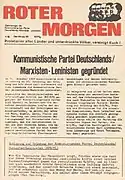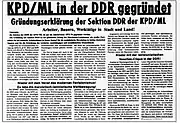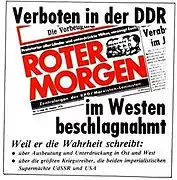Communist Party of Germany/Marxists–Leninists
The Communist Party of Germany/Marxists–Leninists (German: Kommunistische Partei Deutschlands/Marxisten-Leninisten, KPD/ML) was a clandestine communist party active in West Germany and East Germany during the Cold War. It was founded in 1968 by former Communist Party of Germany (KPD) official Ernst Aust, who subsequently became the party's chairman. An anti-revisionist party, the KPD/ML upheld the legacy of Soviet premier Joseph Stalin and supported China under Mao Zedong and later Albania under Enver Hoxha after the Sino-Albanian split.[1] At its peak in the mid-1970s, the party claimed a membership of around 800.[2]
Communist Party of Germany/Marxists–Leninists Kommunistische Partei Deutschlands/Marxisten-Leninisten | |
|---|---|
 | |
| Abbreviation | KPD/ML |
| Chairman |
|
| Founded | 31 December 1968 |
| Dissolved | 1986 |
| Merged into | United Socialist Party |
| Headquarters | |
| Membership (mid-1970s) | c. 800 |
| Ideology |
|
| Political position | Far-left |
| Party flag | |
 | |
The party published a periodical named Roter Morgen (transl. "Red Morning"). Former members of the party continued to publish the newspaper until December 2011.
History
.jpg.webp)
The KPD/ML was founded on 31 December 1968 in Hamburg, West Germany, and was centered around the leadership of Ernst Aust. Rival organisations who were similarly named distinguished themselves by calling the KPD/ML the "Roter Morgen Group", after the party's newspaper Roter Morgen. The party's headquarters were moved from Hamburg to Dortmund in 1973.
The KPD/ML opposed the German Communist Party (DKP), which it believed to be revisionist, and initially oriented itself around Maoism. Aust made his first international trip in 1974, travelling to Albania to meet Enver Hoxha in a private audience. Yao Wenyuan, a member of the Central Committee of the Chinese Communist Party later received Aust on 1 June 1975. At its fourth congress in 1978, the KPD/ML adopted a new programme and disassociated itself entirely from the Chinese Communist Party, rejecting in particular Mao's Three Worlds Theory. Relations between the KPD/ML and the Party of Labour of Albania had significantly cooled by 1984.
Owing to his failing health, Aust resigned as chairman in 1983. Horst-Dieter Koch was elected as the party's new chairman at the conclusion of the fifth party congress on 6 November 1983.
In 1986, the KPD/ML merged with the Trotskyist-oriented International Marxist Group to form the Unified Socialist Party. A handful of members who opposed the merge split off and formed many parties in the tradition of Aust's KPD/ML, the most prominent being the Communist International (Marxist–Leninist), the Organization for the Construction of a Communist Workers' Party, and the Communist Party of Germany (Roter Morgen).
In East Germany
At the end of 1975 and beginning of 1976, the foundation by the KPD/ML of its own section in the East Germany was made public. The corresponding declaration was published in Roter Morgen on 7 February 1976.[3] While the KPD/ML had already been formed in 1968 in West Germany, the nucleus of the East German section emerged within East Germany itself.
In the beginning of the 1970s, some students in the eleventh and twelfth grades at an Extended Secondary School (Erweiterte Oberschule) in East Berlin got together to study the texts of the classical authors of Marxism–Leninism independently of the official version propagated by the Socialist Unity Party of Germany (SED). Other interested people among their friends and families joined them, so that, in the course of time, a little circle of employees (in the education and technical fields) and students (of medicine, language and literature) was formed. In reading the basic texts of Marxist–Leninist social theory they came more and more to the conclusion that a deep gap existed between theory and practice in "actually existing socialism".
In Magdeburg, in 1969 and 1970, pupils, students and apprentices got together to form the Progressive Youth (Progressive Jugend), inspired by, among others, the Black Panthers. Besides the classical authors of Marxism–Leninism, various forbidden texts (of Mao, Stalin, the Black Panthers, etc.) were read and discussed by this youth group, whose activities spanned across East Germany and which was composed of around 100 young people. Following the dissolution of the Progressive Youth by the East German authorities, the "hardcore" elements of the Progressive Youth formed a KPD/ML cell in 1976.
In Rostock, too, an autonomous circle of students was formed with a similar political orientation. Being interested in further ideological inspiration, many of these groups and circles – by themselves – got in touch with various left organizations in West Berlin and with the Albanian embassy in East Berlin.
Besides the young people, who were the majority within the East German section, some older, battle-hardened comrades joined the section. For instance, Heinz Reiche, who had spent 11 years in Nazi prisons and concentration camps, took part in activities in Weißwasser (a township south of Cottbus). Reiche had already come into conflict with the SED in the 1950s.
During the following years, the KPD/ML was successful in gaining supporters and organizing them into party cells in East Germany. These cells were inspired by the cell system of the illegal KPD during the Nazi dictatorship. According to declassified Stasi files, almost a dozen such cells were formed by 1980. The total number of members or supporters of the KPD/ML in East Germany amounted to three dozen people. In addition, there were about 50 to 60 sympathizers who were in direct personal contact with the above-mentioned circle.[4]
Party congresses
| # | Date(s) | Notes |
|---|---|---|
| – | 31 December 1968 | Founding congress |
| I | December 1971 | |
| II | July 1972 | |
| III | February 1977 | |
| IV | 16–18 December 1978 | Held in Hamburg |
| V | 4–6 November 1983 | Horst-Dieter Koch replaced Ernst Aust as chairman. |
| VI | 27–29 December 1985 | Held in Stuttgart |
Election results
| Year | Election | Votes | % | Notes |
|---|---|---|---|---|
| 1974 | Hamburg Parliament | 3,001 | 0.3 | |
| 1975 | North Rhine-Westphalia Landtag | 1,731 | 0.0 | |
| 1978 | Hamburg Parliament | 880 | 0.1 | |
| 1980 | Bundestag | 9,319 | 0.0 | As the People's Front Against Reaction, Fascism and War |
| 1982 | Hamburg Parliament | 716 | 0.1 | Open list including League of West German Communists members |
| 1983 | Bundestag | 3,431 | 0.0 | Open list including League of West German Communists members |
| 1985 | North Rhine-Westphalia Landtag | 434 | 0.0 |
Gallery
 Roter Morgen issue announcing the formation of the Communist Party of Germany/Marxist–Leninist in West Germany
Roter Morgen issue announcing the formation of the Communist Party of Germany/Marxist–Leninist in West Germany Roter Morgen issue announcing the formation of the East German branch of the Communist Party of Germany/Marxist–Leninist
Roter Morgen issue announcing the formation of the East German branch of the Communist Party of Germany/Marxist–Leninist An advertisement for Roter Morgen. The German text in bold reads: "Forbidden in the GDR, confiscated in the West".
An advertisement for Roter Morgen. The German text in bold reads: "Forbidden in the GDR, confiscated in the West".
References
Citations
- Hobday 1986, p. 72.
- Zolling 2017.
- Roter Morgen 1997–1998.
- Stasi 1980.
Books
- Hobday, Charles (1986). Communist and Marxist Parties of the World. ABC-Clio. ISBN 978-0-87436-476-7.
Government publications
- "Sachstandsbericht der MfS-Hauptabteilung XXII über die Situation im Frühjahr/Sommer 1980" [Status report from the MfS Main Department XXII on the Situation in Spring/Summer 1980]. Demokratie statt Diktatur. Stasi Records Agency. Retrieved 9 May 2021.
News and magazine articles
- "New Revelations about the Activities and Destruction of the GDR Section of the Communist Party of Germany/Marxist-Leninist (KPD/ML)". Roter Morgen. Translated by Polifka, Herbert; Tyagi, Rajesh. Revolutionary Democracy. 2001 [December 1997 – February 1998]. Retrieved 13 September 2022.
- Roter Morgen. No. 24. 24 December 1997.
- Roter Morgen. No. 1. 21 January 1998.
- Roter Morgen. No. 2. 5 February 1998.
- Zolling, Peter (14 August 2017). "Wie die kommunistischen APO-Erben das Proletariat suchten und im Establishment landeten". FOCUS. Retrieved 9 May 2021.